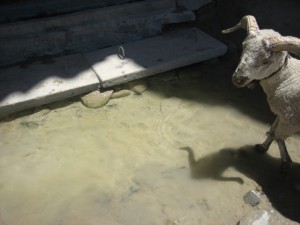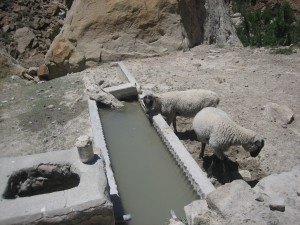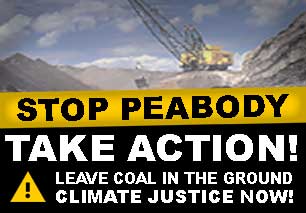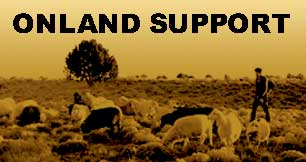Big Mountain/Black Mesa Voices Speak Out Against the Water Settlement
June 21, 2012 by pathfinder
Filed under Latest Posts, Voices from the Land
“What the settlement is trying to do is remove our ability to protect our own source of water. That’s the gist of it. We will have no recourse,” Nicole Horseherder, Black Mesa resident, put it in a recent Indian Country Today article.*
Water for Coal
Since 1974, Peabody Energy and the U.S government have made grand promises to the people of Black Mesa/Big Mountain in order to access the second largest deposit of coal in North America. Equally desirable were the aquifers and rivers used to provide water to desert cities and to slurry coal from Black Mesa to generating stations.
Big Mountain/Black Mesa Relocation resister and matriarch Katherine Smith explained: “On Black Mesa, the earth is getting dry and open, the washes are dry; too much water is going down to California and Phoenix.”
In years of research, most recently in their appeals against the 2011 Kayenta Mine Permit renewal, activists from Big Mountain and Black Mesa have turned up scores of evidence about the severe damage the mine has done to the quality of the water in the N-Aquifer. “The N-aquifer is the groundwater source on which Black Mesa residents depend. It’s also the aquifer from which Peabody Coal [sic] has pumped millions upon millions of gallons of water to transport coal in a pipeline from Black Mesa to the Navajo Generating Station [NGS] in Nevada.”[1]
Activists express deep concern over the parts of the Water Settlement that require the Navajo Nation to renew its lease with NGS until 2044 and the clauses that prohibit any lawsuits against the parties that have caused past or will cause future damage. The renewal of NGS’s lease would effectively keep Peabody’s mining operation functional during that time.
Horseherder said: “the people who have to shoulder the cons [of the settlement] are people of Black Mesa again. It’s coal that’s dug from Black Mesa to provide the power that’s needed to deliver Phoenix and Vegas’ water supply. Once more, we’re giving a corporation another break for free. Basically, they’re being told there’s already evidence to the damage that’s occurred – but they’re off the hook.”
Relocation Redux
Leonard Benally, one of several hundred steadfast Big Mountain relocation resisters, said, “This new bill S.2109 reminds me a lot of PL 93-531, the Relocation Law. We lost our land rights with PL 93-531, we cannot lose our water rights with S.2109. We need to be able to control and use our own water.”
Through corporate and political maneuvering and the fabrication of a land dispute, PL 93-531, the Relocation Law, divided the former Joint Use Area (JUA) of the Hopi and Navajo lands into the Hopi Partitioned Lands (HPL) and Navajo Partitioned Lands (NPL). The forced relocation of about 14,000 Navajos and about 300 Hopis[2] was a part of the process through which Peabody Energy accessed surface rights to the HPL, as well as the millions of gallons of water needed to process and slurry coal.
Dineh activist and scholar John Redhouse notes: “the United States of America has repeatedly violated the human rights and territorial integrity of the Navajo and Hopi people living on Black Mesa and throughout the former JUA (now the HPL)…by robbing the two tribes of their sovereign status and dispossessing them of their aboriginal land base…The bottom line in every major Indian removal program has been white control of land and resources.”
PL 93-531 prohibits Dineh residents of the HPL from maintaining springs and wells, building infrastructure like dams, and accessing new water sources.[3] It has restricted infrastructure development to roads, houses, wells electricity and running water. Many Dineh residents of the HPL travel between 40 and 80 miles round-trip on undeveloped roads to get water for themselves and their livestock. Therefore, as springs dry up and the water table drops because of mining water use, drought, and climate change, HPL residents feel the impacts disproportionately.
Marie Gladue from Black Mesa/Big Mountain stated, “The water being negotiated is right under us on the HPL, but we have no right to it now and is not being addressed by our tribal government. We [HPL residents resisting relocation] have been left out of water deals for too long.”
Water is Life
In the same Indian Country Today article as mentioned above, Jason John, principal hydrologist with the Navajo Nation Water Resource Department, described the unique frustration felt by residents of the HPL: “They see this company that has eight or nine wells pumping thousands of gallons every day for an industrial operation, and here they are having to haul water for their daily lives.”
Nicole Horseherder understands this threat that a lack of accessible, clean water poses to traditional lifeways on Black Mesa thusly: “They [traditional elders and residents of Black Mesa/Big Mountain] understand the connection between the environment and their ability to sustain what they’re doing today. If the water cycle is out of balance as it is now, they know the thing that’s going to be affected first and foremost is their livelihood…What we’ve been relying on all these years are free-flowing natural springs, natural seeps and places where … the water will come right out of a break in the face of the rock,” she said to reporter Anne Minard. She added that generations of people have built cisterns to collect spring water, and cleaned out areas around springs so pools can form.
“People would carry their jugs to these places,” Horseherder said. “Springs dotted Black Mesa like you wouldn’t believe. People have known since the beginning of time living here which springs produce the best water.” But all over Black Mesa, people have been noticing springs that don’t produce any more. “The elders will say, ‘10 years ago was the last time I saw water there.’”
Louise Benally, a relocation resister from Big Mountain, expressed, “If the Navajo tribal government isn’t for the people’s water rights and self determination, then we need tribal governance that listens to the voices of the people. What could be more important for our people than water?”
Another Big Mountain community member said, “This deal doesn’t just affect the Hopi and Navajo Nation. It affects all Native American tribes and it damages the Earth’s ecology. We as a people believe that water is sacred. Let’s act on it.”
Thanks to many generous donations, Black Mesa Indigenous Support (BMIS) is collaborating with the Black Mesa Water Coalition (BMWC) to help get Big Mountain and Black Mesa community members to Window Rock for the vote this Friday, June 22nd. We would like to express our gratitude for the interviews and the opportunity to support this community mobilization.
Liza, Hallie, Derek, & Berkley, with the BMIS collective
- A link to S.2109, the settlement & summaries: http://bit.ly/I8g7pr.
- A link to the Navajo Nation Human Rights Commission’s Article on the Water Settlement and UNDRIP: http://www.navajo-nsn.gov/News%20Releases/NNHRC/2012/Apr12/4412_NNHRCEncouragesPublicParticipationAtForumsAddressingSB2109.pdf
- A link to background information on the settlement: http://www.ourwaterrights.org/
- Also check out this article that explains and refutes the Kyl’s use of a picture of a horse and wagon on the Navajo Reservation to describe how Navajos aren’t transporting water safely and aren’t “using” it properly. Ironically, the picture he’s referring to is of a resident on the HPL, who described how the horse and wagon actually belong to a local roving vet—a Midwesterner of European descent.
*The words “Dineh” and “Navajo” are used interchangeably in this article.
*This article uses the geographic terms “Black Mesa” and “Big Mountain” to describe the areas of the Hopi Partitioned Lands that are close to Peabody’s mines where the Dineh relocation resistance communities are most concentrated.
*Some of the framing as well as the quote from Jason John and all quotes from Nicole Horseherder in this article were originally published in the Indian Country Today article, “Black Mesa Shouldering the Burden of the Navajo-Hopi Water Project”, by Anne Minard (May 27, 2012). They are reprinted here with permission from the author.
*All other quotes from Black Mesa residents are from personal interviews with the Black Mesa Indigenous Support collective and are used with the speaker’s permission.
*Photos by Liza Minno Bloom
Endnotes
TAKE ACTION: Call-In! Cause we ain’t gonna Give-in!(Below is a short/simple guide to help you get started. Please feel free to state those facts/points that you feel are most important to you. If you would like more talking points, please visit www.ProtectThePeaks.org)Hello, my name is ___________ and I am a resident of ____________.
I am calling to ask that your company immediately halt all construction on the (sacred) San Francisco Peaks and withdraw your contract with Snowbowl.(Company name here) is committing gross Human Rights violations against diverse communities of Flagstaff and surrounding areas. Your participation in the expansion of Snowbowl Ski Resort threatens the very health and safety of our communities, the environment, the homes of endangered species and our water security.To the 13 Indigenous Nations that hold this mountain sacred, you are an accomplice in cultural genocide.
To the children who will accidentally eat the snow, you are risking their health and their lives.
And to the fragile alpine ecosystem already under duress, you are committing irreparable harm and death.
You are not absolved of your responsibility. Immediately halt all construction and withdraw your contract with Snowbowl! As long as your involvement continues, we are committed to protecting our communities.————————————- Contact the following companies! ———————————–Towsley Welding & Construction
1 (800) 552-5177 (office)
(909) 866-0600 (shop)
snomaking@aol.com
Fax: (909) 585.7902High Desert Investment Company
(928) 774-9111
Fax: (928) 774-9113
hdico1@qwestoffice.netRSC (Parent Company is Stronger United)
(928) 526.2823
Fax: (928) 526-6815





